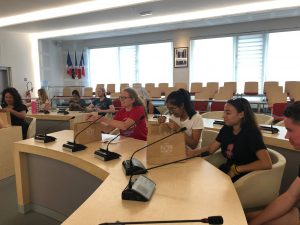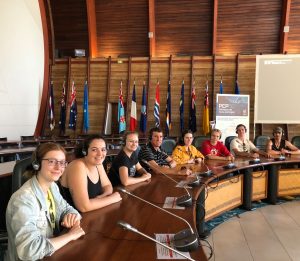Module 2
La grammaire: Le passé composé
LE PASSÉ COMPOSÉ
When to use it and what is its equivalence in English:
In English, this past tense “passé-composé” can be translated into three forms:
To do = I have done, I did do, I did;
To eat = I have eaten, I did eat, I ate;
To arrive = I have arrived, I did arrive, I arrived;
In general, we say that this past tense is used to talk about an action that has taken place only once in the past.
However, there are some variations of meaning within these three forms of the “passé-composé”:
(a) I have done, I have eaten, I have arrived: this particular form with ‘have’ suggests that the action in the past tense continues to have consequences in the present: I have done it i.e. It is done and doesn’t have to be done again; I have eaten ie I’m not hungry now and don’t need to eat any more; I have arrived in Nouméa ie I’m in Nouméa now.
(b) I did do, I did eat, I did arrive, I did get up: this form with ‘did’ emphasizes that the action has defintely been accomplished: I did do it i.e. I’m not lying, I did it, and so on for other actions.
(c) I did, I ate, I arrived, I got up: this form without ‘have’ nor ‘did’ speaks quite simply of the finished action, without saying if the action has consequences on the present nor insisting on the veracity of what we say. This form can situate an action in a series of other actions: He came, he saw, he conquered.
Despite the fact that the “passé-composé” can be interpreted in three different ways, its form does not change even if the meaning varies.
For example:
I have eaten = j’ai mangé
I did eat = j’ai mangé
I ate = j’ai mangé.
How Do We Form It?
The “passé-composé” is what we call “a compound tense”. This means that this past tense is formed from two verbs. The first verb is known as the auxiliary. There are two auxiliary verbs in French “Etre” and “Avoir”. Then, we also need to add the past participle which is the verb that specifies the accomplished action (for example “eaten”). Therefore, the rule you must remember to conjugate a verb in the “passé-composé” is:
Sujet + Auxiliaire (Être ou Avoir au présent de l’indicatif) + Participe Passé
Which Auxiliary Do I Need to Use?
There are two auxiliary verbs in French « Etre » and « Avoir. The good news is that the majority of verbs in French will take « Avoir » as the « helping verb » when trying to conjugate a verb in the «passé-composé» (or any other compound tense). As a result, we recommend that you focus on learning the verbs that will need « Etre » as the « helping verb ».
The verbs that are using « Etre » :
Aller/venir/revenir/devenir/survenir/parvenir
Arriver/partir/repartir
Entrer/rentrer/sortir/ressortir
Monter/remonter/descendre/redescendre
Naître/renaître/mourir
Rester/tomber/retomber/ retourner/passer/repasser
Let’s look at the form of the past participle
In English, the equivalent of this form tends to end in ‘-ed’: I have arrived. However, there are often exceptions: I have done, I have eaten, I have got up.
In French, the past participle form tends to follow a predictable pattern, depending on which group of verbs, the verb we want to conjugate belongs to. You will remember, no doubt, from your Foundation French studies that there are three main group of verbs in French. Those are the verbs ending in ER, IR and RE.
While some verbs have past participles which are quite predictable, others (as you could have predicted, I am sure) are unfortunately to be learned by heart as they do not follow any particular pattern.
- All regular « ER » verbs (and rest reassured that there are many) will simply require that you drop the « er » and add ‘é’ on the past participle.
Manger/mangé
Arriver/arrivé
(Se) lever/levé
The list is extensive for “ER” verbs as the majority of French verbs fall into this category.
- Regular « IR » verbs will require that you drop the « IR » and put an « i » at the end of the past participle.
For example :
- finir / fini « Elle a fini le tressage de la natte hier. »
- choisir / choisi
- réussir / réussi
- obéir / obéi
- maigrir / maigri
- embellir / embelli
- mentir / menti
- partir / parti
- sortir / sorti,
- fuir / fui
- bâtir / bâti
- The third category of verbs is a little bit more complicated. The « RE » verbs would usually require to drop the « RE » and add « u ».
For example :
To lose/perdre/perdu
To wait/attendre/attendu
To hear/entendre/entendu
To go down/descendre/descendu
To bite/mordre/mordu
To melt/fondre/fondu
To beat/battre/battu
To believe/croire/cru
To drink/boire/bu
Of course, there will also be some irregular past participles and it is recommended that you learn them by heart. Below are some examples only. The more you can remember, the better :
To put/mettre/mis
To come/venir/venu
To allow/permettre/permis
To become/devenir/devenu
To hold/tenir/tenu
To take/prendre/pris
To understand/comprendre/compris
To learn/apprendre/appris
To surprise/surprendre/surpris
To drive/conduire/conduit
To offer/offrir/offert
To construct/construire/construit
To open/ouvrir/ouvert
To destroy/détruire/détruit
To cover/couvrir/couvert
To introduce/introduire/introduit
To produce/produire/produit
To translate/traduire/traduit
To die/mourir/mort
To read/lire/lu
To know/connaît/connu
To do/faire/fait
To be born/naître/né
To be/être/été
To tell/dire/dit
To write/écrire/écrit
To laugh/rire/ri
To smile/sourire/souri
To follow/suivre/suivi
Reminder: What does the passé composé look like?
We must conjugate the auxiliary avoir or être in the present of the indicative form + add the correct past participle (remember that the ending will change depending on wether it is a ER, IR or RE verb but also if it is a regular or irregular verb).
It is always a good idea to break it down in this way :
Step 1: Ask yourself, what is the infinitive (also known as the plain form of the verb) of the verb that I am trying to conjugate?
Step 2: L’infinitif could be Regarder, Finir, Attendre, Voir etc.
Step 3: Do you know what is the « participe passé » of these four verbs above?
More examples: Le passé composé avec Avoir
REGARDER
J’ai regardé
Tu as regardé
Elle/Il/On a regardé
Nous avons regardé
Vous avez regardé
Ils/Elles ont regardé
As a general rule we say that if the auxliary verb is « Avoir » it does not need agreement. For example the past participle does not agree with its subject : Elle a regardé.
However, the past participle agrees with its direct object if there is one (la/her or les/them).
For example :
Elle les a regardé(e)s.
Je l’ai embrassée.
Le négatif : Elle ne les a pas regardé(e)s. Je ne l’ai pas embrassée.
Le passé composé avec Etre
ALLER
Je suis allé(e) nous sommes allés (es)
tu es allé(e) vous êtes allé (s) (e) (es)
il est allé ils sont allés
elle est allée elles sont allées
on est allé (s) (es)
Le négatif : Je ne suis pas allé(e). Je n’y suis pas allé(e).
L’interrogatif : Est-ce que tu es allé(e) …. ? Es-tu allé(e) … ? Tu es allé(e) … ?
The verbs that will take « Etre » as an auxiliary verb must agree with the past participle in gender and number. For example : Elle est allée au cinéma. Ils sont restés trois jours à Papeete.
Sometimes intransitive verbs that normally require to be conjugated with ‘être‘ can become transitive, that means they are acting on the world, describe actions rather than the state of something. They are then conjugated with the auxiliary verb ‘to have’. These verbs are:
Monter, Descendre, Retourner, Sortir, Rentrer, Passer
Can you spot the differences between these examples? How would you translate the sentences below?
– Mon cousin a monté des courses pour son grand-père en brousse hier matin. vs Mon cousin est monté en brousse hier matin pour déposer des courses à son grand-père.
– Il a sorti un fusil et il a tiré sur le cerf. vs Il est sorti hier soir pour chasser.
– Elle a passé trois semaines à Tahiti. vs Elle est passée trois fois chez toi hier après-midi.
A vous : Mettez au passé composé et recherchez les termes qui sont soulignés :
1. Nous finissons la coutume avec le discours du grand chef.
2. Elle regarde passer les bus dans Port Vila.
3. Ils entendent les bruits des roussettes dans les manguiers.
4. Ces contes mélanésiens? Je ne les raconte jamais à mes petits-enfants.
5. Bois-tu beaucoup de kava ?
A vous: Mettez au passé composé avec ‘avoir’ ou ‘être’ et recherchez les termes qui sont soulignés :
1. Ils montent ensemble à Makatea.
2. Tu montres tes jouets à Manatea ?
3. Elle vient vous voir à Bourail.
4. Je ne pars pas seule à l’Île-des-Pins
5. Il marche à l’Anse Vata.
Activité de Recherche
Choisissez trois mots/termes soulignés ci-dessus en vert puis rédigez un résumé en français ou en anglais pour les expliquer. Vous pouvez également par la suite partager vos découvertes à voix haute avec le reste de votre classe.
Listening Activity: La littérature en Polynésie Française.
Learn more about the literature of French Polynesia.
Sentence Building Activity: La littérature du Pacifique
Improve your writing skills by building and expanding on the sentences below:
- Cette légende raconte…
- Les contes sont ….
- Les cultures océaniennes offrent…
- Dans le Pacifique, il y a beaucoup de….
- La littérature orale polynésienne….
- Les auteurs du Pacifique expliquent …
Find the Words
Analyse et discussion: Analysez les images et décrivez-les en français.





360 Pacific French Adventure: La Librairie
Voices of the Pacific French: ‘Ia Ora Na
Watch this video clip and discuss with a partner what you understand and see:
Tahitian is known as one of the indigenous Polynesian languages spoken in French Polynesia. Unlike French, in Tahitian, all letters are pronounced. Learn some Tahitian.
Below are the lyrics of the song above in Tahitian (Reo Tahiti). The singer’s name is Ken Carlter. His songs are available on YouTube and he sings in both French and Tahitian. Singing is a great way to exercise the muscles in your mouth which will help improve your overall speaking skills, including clearer pronunciation of the target language. Sing along and do some research to find the translation in French of the lyrics below:
IA ORA NA NA NA NA NA NA NA E (x4)
Ia Ora, Manava, Maeva, ia ‘oe
E Fenua Nehenehe
Ua riro ‘oia, ei moemoea
ra’a na te mau ratere
No te ‘una ‘una te moana
Te mau fa’a
Ua riro ‘oia , ei te’ote’o ra’a,
no te mau, ma’ohi
Aue Aue
Ua Totara te moa
Ua Haha Te Mama
Haere mai !
IA ORA NA NA NA NA NA NA NA E (x4)

